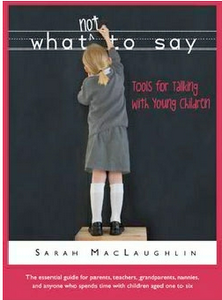I’m happy today to be hosting Sarah MacLauglin on my blog. When I read the description of her book, I was immediately interested in what she had to say. I am not a parent, but as an aunt and a regular fixture in the homes of friends with children, sometimes they say things that you just don’t know how to respond to. I asked Sarah for tools for talking with these kids that are not our own and she provided the following guest post. Sarah is also giving away a copy of her book to a commenter and from her site, a Kindle Touch! Comment below and show Sarah some love. I will also be reading her book and reviewing it in an upcoming Reading Challenge post, so you will definitely hear more about this title soon.

What do I Say?
Navigating Difficult Subject Matter with Other People’s Kids
By Sarah MacLaughlin, Award-winning Author of What Not To Say: Tools for Talking with Young Children
When I was a nanny, I ran into all kinds of subjects that I didn’t know exactly how to navigate. But navigating is a good metaphor. When you navigate, you are aware of your surroundings. You take your time. You check the map. You pay attention to where you already are. You listen. Take these concepts with you as a compass.
When you are discussing a hot topic with a young child, you want to keep their developmental age in mind. When you are talking to a child that is not your own, you want to pay attention to that, and the fact that the child does not belong to you. (Do our own children even really belong to us? That language could use some freshening up, but I’ll save it for a different post!)
There are the big three: sex, death and God. I’m sure there are others; divorce and war come to mind as not the easiest. But these are probably the most hair raising topics. I’ve bumped into all of the above in my work with other people’s children. Here are a few suggestions as you take your compass and embark on these conversations:
1. Acknowledge your own discomfort. This is such an important step. Even if you don’t say anything aloud, just take a few seconds to see, internally, that you are uncomfortable. This is completely okay. Your nephew asks why his parents are getting a divorce. A child in your classroom asks what happens after we die. Your niece is curious about gay marriage. Our culture has taboo and controversial topics. We help demystify them when we feel this discomfort and move through it—forging on with the dialogue. Pay attention to your body language. If you are extremely uneasy about the issue, you can say that aloud in a way that conveys ownership, then go from there.
2. Listen and ask questions instead of giving answers. If you close your mouth and open your ears, you are on the right track. You probably don’t have the answers anyway, which is perfectly fine. You can ask open-ended questions like, “Tell me more about that,” or “How do feel when you think about that.” You can also validate a child’s feelings if they name them, “You’re feeling nervous and upset. It’s okay to feel that way.
3. Use language that is not directive or definitive. When I was interacting with other’s kids, I found myself using broad language. My values and belief system were possibly not the same as the families. Useful phrases like, “People have lots of different opinions about that,” or “I’m not sure about that,” came out of my mouth often (and by the way, still do with my “own” child.) You can also suggest that a child ask their parents about it (whatever “it” is.) You could say, “I’m sure Mom would be interested in speaking with you about this too,” which is so much more open-ended than, “You better talk to your mother about that!”A last couple of statement that are good for a myriad of situations: “That is really such a mystery,” and my all-time favorite, “Some people believe…”
4. Check in with the child’s grown-up. This does not have to be a big discussion, but if you have a discussion with a child about any of these big subjects, I think it is common courtesy to let the parent know the overview of what came up, and how you handled it.
Tips and strategies for places where we feel out of our depth are valuable. You might not always know where you are headed, but it sure does help if you have that compass and map!
I’d love to hear what you think!
Special Giveaway!
Please comment on this post about what you say to other people’s children, so that you can enter to win an ebook copy of
What Not to Say: Tools for Talking with Young Children
, in the format of your choice: PDF, epub, or Kindle format. Sarah will be giving away one copy at each blog stop and will announce it on the comments of this post tomorrow. (Other stops during this Blog Tour are listed on Sarah’s blog here:
http://sarahsbalancingact.blogspot.com/p/blog-tour.html
) Be sure to leave your email so we can contact you in case you’re the winner!
Also, be sure to enter at Sarah’s site (
http://sarahsbalancingact.blogspot.com/p/blog-tour.html
) for the
Grand Prize Giveaway:
. Winner will be announced at the end of the tour after July 15th.
About The Author
Sarah MacLaughlin has worked with children and families for over twenty years. With a background in early childhood education, she has previously been both a preschool teacher and nanny. Currently, Sarah works as a licensed social worker with foster families at The Opportunity Alliance in South Portland, Maine.
She also teaches parenting classes and consults with families. In addition, Sarah serves on the board of Birth Roots, a perinatal resource center, and writes the “Parenting Toolbox” column for a local parenting newspaper, Parent & Family.
As reflected in her book, What Not to Say: Tools for Talking with Young Children, Sarah considers it her life’s work to promote happy, well-adjusted people by increasing awareness of how children are spoken to today.

In a busy modern life, while Sarah juggles her son, her job, her husband, her family, and time for herself, she’s also aiming for: mindful parenting, meaningful work, joyful marriage, connected family, and radical self-care. She is mom to a young son who gives her plenty of opportunities to take her own advice about What Not to Say. More information about Sarah and her work can be found at her site:
http://www.saramaclaughlin.com
.
